Life insurance protects you and your family from economic hardship as a result of death. It is an insurance company’s obligation to pay the recipient of your choice a pre-determined amount of money when you die in exchange for timely payment of premiums while you are living.
Do you really need life insurance? Well do you want to provide for your family and loved ones in a manner to which they have become accustomed in the untimely event of your death? If you are the primary breadwinner who will pay the mortgage on the house your spouse and children live in if you pass? Who will provide financially for your family if you are gone? How will your children’s education be financed in your absence? And finally how will your burial expenses be covered?
Now that you have decided you do indeed need life insurance, how much do you need and if you already have life insurance do you have enough? Some things you will need to consider when making this decision:
How much can your family afford to pay off your mortgage loan or your rent if you die?
How much debt will you leave behind to include credit card balances, car loans, student loans, personal loans etc.?
How much annual income will your death remove from your household?
How much will the funeral you desire cost?
Do you want to leave behind a charity fund in your name?
Do you have special family members you would like to leave a financial gift behind for?
How much will your spouse need to care for a family member with special needs?
How much do you want to leave behind for your children’s education expenses?
Once you calculate how much money you want to leave behind consider how much you currently have in terms of individual or group life insurance along with your other assets such as savings accounts, CDs, mutual funds, stocks, bonds, 401K, retirement plans or pension plans and subtract that amount to decide how much life insurance you currently need to purchase.
By Tim Gorman
Respect for the dead, burial and Mourn for dead people. When a loved one dies, grieving family members and friends often are confronted with dozens of decisions about the funeral - all of which must be made quickly and often under great emotional duress.
Thursday, May 31, 2007
Wednesday, May 30, 2007
Planning A Funeral Memorial
Saying goodbye to a loved one who has passed away is difficult in any capacity. In many cases, during this time of emotional upheaval, family members are also faced with a bevy of decisions. Funeral arrangements must be made and if there is no plan in place, such details can be extremely overwhelming. Of course, there is also the option of holding a funeral memorial to honor your loved one.
A traditional funeral is held just prior to burial in either a funeral parlor or place of worship. In most cases, a casket containing the deceased is present at the funeral. A funeral memorial, however, takes place without the presence of the deceased and, because of this, can be held anywhere and at any time.
Some people choose to hold a funeral memorial if the deceased was not particularly religious; or if they would rather those honoring their loved one remembered them the way that they were rather than having the casket as a lasting visual. In some terrible cases, the body of the deceased is not available because of the manner of death. A funeral memorial may be held in this situation.
A funeral memorial can actually be a quite moving service. Not confined to any particular location, a funeral memorial can be held at a place that was special to the deceased. There is no limit the places you can hold a funeral memorial – including holding it an outdoor location. Normally, a funeral memorial will showcase pictures of the deceased. You may also choose to include favorite pieces of music, as well as readings by the attendees. Ultimately, a funeral memorial is designed to honor the life of your loved one; you are not limited in any capacity in doing this.
In some situations, the deceased may have planned their own funeral memorial prior to their death. If this is the case, then it is simply your job to set into motion the decisions that have already been made. If there is no plan in place, then it is up to the family members to plan a fitting funeral memorial. This is a process best done together; join together as a group united in planning a funeral memorial reflective of their loved one’s unique personality.
By Michelle Bery
A traditional funeral is held just prior to burial in either a funeral parlor or place of worship. In most cases, a casket containing the deceased is present at the funeral. A funeral memorial, however, takes place without the presence of the deceased and, because of this, can be held anywhere and at any time.
Some people choose to hold a funeral memorial if the deceased was not particularly religious; or if they would rather those honoring their loved one remembered them the way that they were rather than having the casket as a lasting visual. In some terrible cases, the body of the deceased is not available because of the manner of death. A funeral memorial may be held in this situation.
A funeral memorial can actually be a quite moving service. Not confined to any particular location, a funeral memorial can be held at a place that was special to the deceased. There is no limit the places you can hold a funeral memorial – including holding it an outdoor location. Normally, a funeral memorial will showcase pictures of the deceased. You may also choose to include favorite pieces of music, as well as readings by the attendees. Ultimately, a funeral memorial is designed to honor the life of your loved one; you are not limited in any capacity in doing this.
In some situations, the deceased may have planned their own funeral memorial prior to their death. If this is the case, then it is simply your job to set into motion the decisions that have already been made. If there is no plan in place, then it is up to the family members to plan a fitting funeral memorial. This is a process best done together; join together as a group united in planning a funeral memorial reflective of their loved one’s unique personality.
By Michelle Bery
Tuesday, May 29, 2007
A Memorial Notice
With a mobile and dispersed society, friends and relatives are likely to be scattered far and wide. They may never see the obituary in a local paper and may not be able to attend the memorial or funeral service. Using her mother's Christmas card list, Beth sent out a notice of her mother's death.
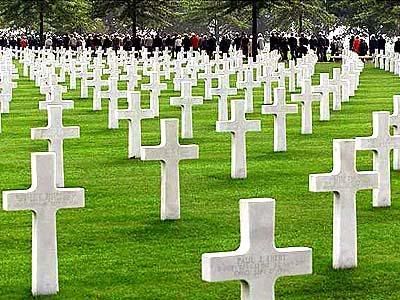
Written as a tribute to her mother, Beth listed some of her mother's remarkable traits and accomplishments. It ended with suggestions for memorial donations, to causes that her mother supported—peace, the arts, and education. This sort of card can be easily put together on a home computer or copied at a local copy shop, including a picture if one is wanted. A wide choice of nice paper in many colors is available.
from : www.funerals.org

Written as a tribute to her mother, Beth listed some of her mother's remarkable traits and accomplishments. It ended with suggestions for memorial donations, to causes that her mother supported—peace, the arts, and education. This sort of card can be easily put together on a home computer or copied at a local copy shop, including a picture if one is wanted. A wide choice of nice paper in many colors is available.
from : www.funerals.org
Monday, May 28, 2007
Memorial Refreshments
Sharing food during a bereavement gathering remains a popular practice. The ladies of the church put on a huge pot-luck supper in the town hall after one resident's memorial service. But it might be as simple as iced tea and cookies supplied by the family at an "Open House" at home or as fancy as a reception at the local inn. One man has asked for "a cocktail party," and his wife intends to oblige.
from : www.funerals.org
from : www.funerals.org
Sunday, May 27, 2007
Memorial Flowers
Barbara's family had potted chrysanthemums decorating the church. The pots were offered to special friends and relatives to take with them after the service, to remember Barbara-the-gardener in years to come. This thoughtfulness shows that this family had thought through the question, "What will happen to the flowers after the service?"
Saturday, May 26, 2007
Photographs and Memory Books
Shelby found that the pictures displayed at her sister-in-law's memorial really broke the ice for tearful family and friends as they reminisced over the hilarious old fashions.

You might want to ask friends and relatives to contribute photos, clippings, awards, or other special mementos that can be assembled in a memory book for the surviving spouse or family.

You might want to ask friends and relatives to contribute photos, clippings, awards, or other special mementos that can be assembled in a memory book for the surviving spouse or family.
Friday, May 25, 2007
Memorials Music
Beginning the service with music and ending the service with music creates natural "bookends" for the event. The universal language of music can be calming, healing, or unifying as people gather, whether played by community musicians or made available on CD. In this age of personalization, anything goes—jazz, a Bach organ concerto, a New Age harp.
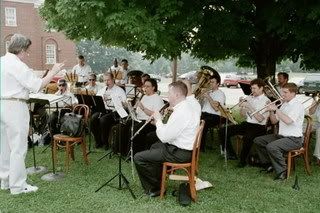
Attendees are even likely to be forgiving of a grandchild's imperfect flute rendition of "O Danny Boy" when it's offered with love.

Attendees are even likely to be forgiving of a grandchild's imperfect flute rendition of "O Danny Boy" when it's offered with love.
Thursday, May 24, 2007
The Service Itself
If there are no religious dictates, you may want to pick a theme of remembrance exemplifying the deceased. Will he be remembered most for his civic activity or his wild ties and the story behind each? Will she be remembered for her gardens and charity work or her practical jokes? Are there favorite readings of the deceased? Bible verses or Zen philosophy? Poetry? (Ernest Morgan's book Dealing Creatively with Death has some excellent examples and suggestions.)
Did the deceased leave writings, maybe instructional or inspirational letters a relative has saved? You could ask friends and relatives to write up a favorite memory to read aloud or to be read. (Having those vignettes in writing, too, will mean a lot to a surviving spouse or off-spring after the service.) Some families may decide to print a formal program for the service, listing music to be played and the readings to be given, but it is not necessary.
Did the deceased leave writings, maybe instructional or inspirational letters a relative has saved? You could ask friends and relatives to write up a favorite memory to read aloud or to be read. (Having those vignettes in writing, too, will mean a lot to a surviving spouse or off-spring after the service.) Some families may decide to print a formal program for the service, listing music to be played and the readings to be given, but it is not necessary.
Wednesday, May 23, 2007
Who Will Come?
You should decide if there will be a public announcement in the newspaper, whether a written mailing to certain friends and associates seems better, or whether phone calls and the local "grapevine" will be sufficient notice.
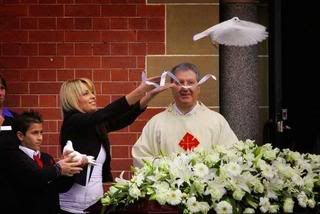
Who Will Lead the Service?
Obviously, clergy are likely to be involved with any service in a church, temple, synagogue, or mosque—the program determined by religious practice and protocol. You can certainly ask clergy to participate in a service held elsewhere, too. But even religious services are being adapted to allow participation from attendees, with people invited to share their memories and thoughts after the initial service, making the occasion more memorable.
As for others who might lead or facilitate a service, the personalities of the people involved may dictate the best choice. A spouse who is shy about public speaking would likely defer to an adult son or daughter who is at ease leading the local Rotary or Girl Scout Jamboree. Maybe a best friend or sibling could be asked to preside. If several will participate, it's a good idea for one of them to be designated with the coordinator's role, to avoid awkward hesitations as to who should do what next.
It is always nice to find a role for children to play if the deceased was a special person in their lives. Handing out flowers or programs can be managed by even young children or grandchildren. Some may wish to draw pictures for a memory book.

Who Will Lead the Service?
Obviously, clergy are likely to be involved with any service in a church, temple, synagogue, or mosque—the program determined by religious practice and protocol. You can certainly ask clergy to participate in a service held elsewhere, too. But even religious services are being adapted to allow participation from attendees, with people invited to share their memories and thoughts after the initial service, making the occasion more memorable.
As for others who might lead or facilitate a service, the personalities of the people involved may dictate the best choice. A spouse who is shy about public speaking would likely defer to an adult son or daughter who is at ease leading the local Rotary or Girl Scout Jamboree. Maybe a best friend or sibling could be asked to preside. If several will participate, it's a good idea for one of them to be designated with the coordinator's role, to avoid awkward hesitations as to who should do what next.
It is always nice to find a role for children to play if the deceased was a special person in their lives. Handing out flowers or programs can be managed by even young children or grandchildren. Some may wish to draw pictures for a memory book.
Tuesday, May 22, 2007
Setting the memorial
In planning a memorial service, you will probably want to decide whether a formal service reflects the personality of the deceased more than an informal one. Warren had church affiliations, so it was logical that his memorial service was held at his church. Richard had not maintained his church affiliations, so his wife chose to use a funeral home for a Masonic rite back in the home state where his ashes will be scattered or buried.
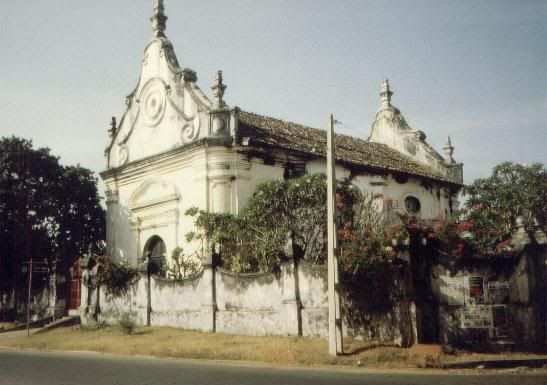
Paul's father spent the last four years of his life in a retirement community. Because it would have been difficult for many of his friends to travel, Paul held a memorial service in the activities room there. Anne's love of art and music made the local art museum the perfect location for her friends to enjoy a concert in her memory. Mary Jane was a country-living soul. A hillside gathering amidst the wildflowers was a perfect setting in which to sit around in jeans and share memories.

Paul's father spent the last four years of his life in a retirement community. Because it would have been difficult for many of his friends to travel, Paul held a memorial service in the activities room there. Anne's love of art and music made the local art museum the perfect location for her friends to enjoy a concert in her memory. Mary Jane was a country-living soul. A hillside gathering amidst the wildflowers was a perfect setting in which to sit around in jeans and share memories.
Monday, May 21, 2007
Planning a Memorial Service
Among the many issues at hand when a loved one dies there are two important ones to decide: planning for the timely disposition of the body and commemorating the life that was lived. When you can separate those two activities, you have a great many more options, both in kind and in cost.
A "funeral" service is with the body present and is usually planned within a few days of death, sometimes in great haste. A "memorial" service (without the body) can be delayed as long as you want, to meet the convenience or needs of the family. Perhaps it makes sense to have the service at the summer home of the deceased when all were planning to gather anyway. Scheduling the event in two or three weeks lets out-of-town guests take advantage of the 14-day advance booking discount on airline tickets. Or perhaps you will want to wait for the survivor of a car crash to get out of the hospital. By not feeling pressured to have a service right away, there is time for thoughtful planning. A memorial mass is now accepted by the Catholic church.
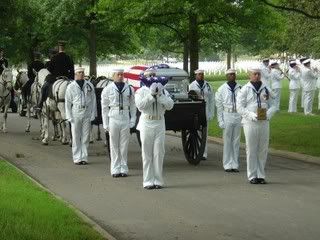
Multiple services may be appropriate in some situations--a simple graveside service for the immediate family at the cemetery "back home," followed by a memorial service in the community where the deceased more recently lived. Or one service for co-workers and another for community and friends.
Many funeral directors will be glad to assist with memorial service planning whether using the funeral home location or not, but there will be a charge for such services. However, many families have found it therapeutic and loving to take charge without the help of a funeral director. Having something to do takes away the sense of helplessness survivors often feel at a time of death.
A "funeral" service is with the body present and is usually planned within a few days of death, sometimes in great haste. A "memorial" service (without the body) can be delayed as long as you want, to meet the convenience or needs of the family. Perhaps it makes sense to have the service at the summer home of the deceased when all were planning to gather anyway. Scheduling the event in two or three weeks lets out-of-town guests take advantage of the 14-day advance booking discount on airline tickets. Or perhaps you will want to wait for the survivor of a car crash to get out of the hospital. By not feeling pressured to have a service right away, there is time for thoughtful planning. A memorial mass is now accepted by the Catholic church.

Multiple services may be appropriate in some situations--a simple graveside service for the immediate family at the cemetery "back home," followed by a memorial service in the community where the deceased more recently lived. Or one service for co-workers and another for community and friends.
Many funeral directors will be glad to assist with memorial service planning whether using the funeral home location or not, but there will be a charge for such services. However, many families have found it therapeutic and loving to take charge without the help of a funeral director. Having something to do takes away the sense of helplessness survivors often feel at a time of death.
Sunday, May 20, 2007
Pre-Planning a Funeral
Pre-Planning a Funeral or Memorial--Preneed Funeral Planning. No one likes to think about death, let alone plan for it. In many families, discussing one's mortality is an extremely uncomfortable topic.
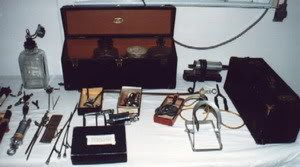
By pre-planning your funeral, you relieve your family of having to make important financial decisions during a period of great stress and grief.
This section contains everything you need to know about pre-planning a funeral

By pre-planning your funeral, you relieve your family of having to make important financial decisions during a period of great stress and grief.
This section contains everything you need to know about pre-planning a funeral
Saturday, May 19, 2007
About Memorials
Much like a funeral, a memorial service celebrates the life of the deceased. The only difference is that there is no body present. Memorials are often held in a church, a fraternal hall, or other appropriate location, and take place a few days or a couple of weeks after the death of a loved one.
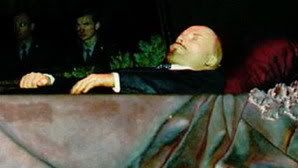
In recent years, more and more people choose memorials especially those whose loved ones have been cremated and whose remains have already been disposed. Maybe the ashes are already stored in a columbarium or have been scattered somelace. There's no format to the service, but proponents say it's simple yet dignified. There are prayers and music, sometimes contemporary, such as Sarah McLachlan's "Angel" or Eric Clapton's "Tears in Heaven."
Sometimes it's followed by a short sermon or meditation and friends speaking about the deceased and his or her achievements and contributions to society. In lieu of a body is a display of photos showing the high points of the deceased's life.
The definite advantage here is the cost- no embalming, no casket, no grave liner or vault. The organized memorial service movement wants to do away with elaborate funerarl rites advocating "dignity, simplicity, and economy" instead. The feeling is that spirituality is sacrificed with all the materialist trappings associated with funerals.
An opponent to memorials, Dr. George E. LaMore, Jr., argues, "There's minimum confrontation with death, minimum ministry and ceremony for the living. . . . A terrible cheapening of both life and death is implied by all this. . . ."

In recent years, more and more people choose memorials especially those whose loved ones have been cremated and whose remains have already been disposed. Maybe the ashes are already stored in a columbarium or have been scattered somelace. There's no format to the service, but proponents say it's simple yet dignified. There are prayers and music, sometimes contemporary, such as Sarah McLachlan's "Angel" or Eric Clapton's "Tears in Heaven."
Sometimes it's followed by a short sermon or meditation and friends speaking about the deceased and his or her achievements and contributions to society. In lieu of a body is a display of photos showing the high points of the deceased's life.
The definite advantage here is the cost- no embalming, no casket, no grave liner or vault. The organized memorial service movement wants to do away with elaborate funerarl rites advocating "dignity, simplicity, and economy" instead. The feeling is that spirituality is sacrificed with all the materialist trappings associated with funerals.
An opponent to memorials, Dr. George E. LaMore, Jr., argues, "There's minimum confrontation with death, minimum ministry and ceremony for the living. . . . A terrible cheapening of both life and death is implied by all this. . . ."
Friday, May 18, 2007
Hold a Funeral
When a person dies, we acknowledge his or her passing by holding a funeral, which is the traditional way in this country to honor and pay last respects to a dear departed. A call is made to a funeral home, which takes care of removing the body, often from a nursing home, hospital or hospice.
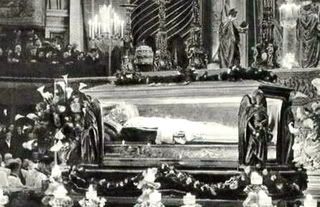
The body is prepared-embalmed, dressed, and ready for viewing. For some families, viewing is imperative. Says author Elizabeth Kubler-Ross, "It is important that the family can view the body before the funeral in order to prevent any late denial of death." A brief ceremony is usually held at the funeral home, then continued at the church- with hymns, scripture readings, a short sermon, and sometimes a eulogy.
A procession to the cemetery follows (for either ground or above-ground burial in a mausoleum or crypt) and concludes with a brief graveside service. Afterwards it is customary for friends and other mourners to gather at the family home for more expressions of sympathy.
For many, having this whole ceremony with viewing is beneficial. "They need to see the body of their loved one, be close to it," says funeral director Fares J. Radel. "It also provides closure and makes them realize that indeed a life has ended." And that life is celebrated when you hold a funeral.
"It's a coming together of families, sort of a reunion to honor the deceased," offers one Cincinnati, Ohio, funeral director. Funerals, in whatever form, are beneficial to the survivors not only as a reminder of their mortality, but also as a means of helping them accept the loss and move on with life.

The body is prepared-embalmed, dressed, and ready for viewing. For some families, viewing is imperative. Says author Elizabeth Kubler-Ross, "It is important that the family can view the body before the funeral in order to prevent any late denial of death." A brief ceremony is usually held at the funeral home, then continued at the church- with hymns, scripture readings, a short sermon, and sometimes a eulogy.
A procession to the cemetery follows (for either ground or above-ground burial in a mausoleum or crypt) and concludes with a brief graveside service. Afterwards it is customary for friends and other mourners to gather at the family home for more expressions of sympathy.
For many, having this whole ceremony with viewing is beneficial. "They need to see the body of their loved one, be close to it," says funeral director Fares J. Radel. "It also provides closure and makes them realize that indeed a life has ended." And that life is celebrated when you hold a funeral.
"It's a coming together of families, sort of a reunion to honor the deceased," offers one Cincinnati, Ohio, funeral director. Funerals, in whatever form, are beneficial to the survivors not only as a reminder of their mortality, but also as a means of helping them accept the loss and move on with life.
Thursday, May 17, 2007
Funeral or Memorial Service--Which One's Right for You?
"Funerals are for the living . . . to rejoice in the one who has caused this coming together." --Maestro Leonard Bernstein
Decisions, decisions. Hold a traditional funeral like our parents and grandparents did? Should we go for the whole ritual with the casket open and viewed by mourners? Or is it time to consider a more modern and innovative way to pay our last respects?
Or would you prefer a memorial focusing on the achievements and contributions of the deceased? It's actually all the same, according to Fares J. Radel of Radel Funeral Home, who says, "You celebrate a life lived. The difference is a body is not present in a memorial."
Decisions, decisions. Hold a traditional funeral like our parents and grandparents did? Should we go for the whole ritual with the casket open and viewed by mourners? Or is it time to consider a more modern and innovative way to pay our last respects?
Or would you prefer a memorial focusing on the achievements and contributions of the deceased? It's actually all the same, according to Fares J. Radel of Radel Funeral Home, who says, "You celebrate a life lived. The difference is a body is not present in a memorial."
Wednesday, May 16, 2007
Consumer Satisfaction with Funeral Homes
The funeral service industry has gotten a lot of negative press in the past few years, but several recent studies and a US government report indicate customer service satisfaction levels are very high when it comes to funeral service-one of the highest of any industry.
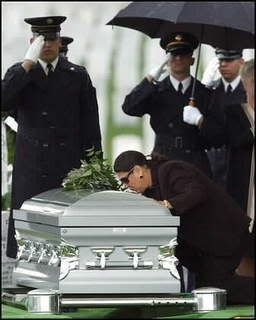
A 2000 survey by Wirthlin Worldwide gave the industry a 69% across the board positive rating and a 5:1 ratio of positive to negative comments (the report says 3:1 is considered healthy for an industry). Funeral directors also received positive commendations in a Gallup poll, where they ranked in the top 15 professions for honesty and ethics. According to the 1,028 adults surveyed in the 2000 poll, funeral directors possess higher standards of honesty and ethics than business executives, building contractors, journalists, real estate agents, and insurance salespeople.
The Better Business Bureau reports it receives few complaints about funeral service as well. 1999 complain statistics rankings released by the BBB-a total of 197 complaints rank the industry 298th overall in complaints received, and individual funeral directors rank 345th with a total of 149 complaints. Adding cemeteries and cremation service providers brings the industry total for 1999 to 413. Since nearly 2.4 million deaths occurred that year, that means approximately one complaint was filed for every 5,800 deaths. Contrast this to franchised automobile dealers, who received 17,686 complaints in the same time period.
The US government notes the number of complaints for the funeral service industry is "generally low compared to complaints about other types of consumer issues," and a General Accounting Office analysis shows funeral homes across the country with a very high rate of compliance with the Federal Trade Commission's Funeral Rule.

A 2000 survey by Wirthlin Worldwide gave the industry a 69% across the board positive rating and a 5:1 ratio of positive to negative comments (the report says 3:1 is considered healthy for an industry). Funeral directors also received positive commendations in a Gallup poll, where they ranked in the top 15 professions for honesty and ethics. According to the 1,028 adults surveyed in the 2000 poll, funeral directors possess higher standards of honesty and ethics than business executives, building contractors, journalists, real estate agents, and insurance salespeople.
The Better Business Bureau reports it receives few complaints about funeral service as well. 1999 complain statistics rankings released by the BBB-a total of 197 complaints rank the industry 298th overall in complaints received, and individual funeral directors rank 345th with a total of 149 complaints. Adding cemeteries and cremation service providers brings the industry total for 1999 to 413. Since nearly 2.4 million deaths occurred that year, that means approximately one complaint was filed for every 5,800 deaths. Contrast this to franchised automobile dealers, who received 17,686 complaints in the same time period.
The US government notes the number of complaints for the funeral service industry is "generally low compared to complaints about other types of consumer issues," and a General Accounting Office analysis shows funeral homes across the country with a very high rate of compliance with the Federal Trade Commission's Funeral Rule.
Tuesday, May 15, 2007
Family Advisor--State-of-the-Art Funeral Arrangement System in Action
No question about it. Family Advisor, a first in the funeral industry business, is making it easy for families to plan funerals for their loved ones. With the touch of the keyboard and a 36-inch color computer monitor, the bereaved can choose a casket and make funeral arrangements. They need not walk with the funeral director through a roomful of caskets, which can be forbidding.
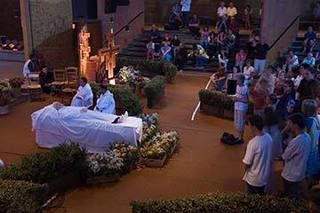
This groundbreaking approach, called Family Advisor, is the brainchild of Chris Barrott, executive vice president of operations at Aurora Casket Company, a 110-year-old family business based in Aurora, Indiana, a tiny town where the company turns out 500 caskets a day--caskets of every style, price and color. Name it and they have it-bronze, copper, stainless steel, carbon-steel.
How it works? Family Advisor allows funeral directors to present funeral plans to families in a comfortable and relaxed setting. Instead of marching through the traditional showroom, with maybe 30 caskets, the bereaved family members sit around a small conference table and view the caskets and other related products on the computer monitor. They see all the options in front of them and they can ask questions, which the funeral director can answer or point to to a specific video presentation addressing the issue.
And talk about options. Lance Larkin of Larkin Mortuary in Utah, one of the first funeral homes to use the Family Advisor, says he's able to show more than 120 caskets and 200 varieties of urns with the push of a button. Plus related products such as guest registers, floral pieces. No need to check all over town for a florist. This indeed is one of the biggest benefits of Family Advisor- to have a "virtual inventory" of all products available from the service center. Maggie Volski of Staley-Crowe says the system offers everything from caskets to vault liners to flowers-everything needed for a funeral. "Yes, we're even able to type the obituary right there and then." It makes funeral arrangement conferencing go more smoothly, according to Volski, who says they are so pleased with the system -the options, the sharper images-as well as the families they serve.
Rick Sadler, at Poway-Bernardo Mortuary in San Diego, who was reluctant to move away from a traditional selection room but has now elected to use the system, says that families are pleased with the interactive approach to looking and selecting merchandise on the computer monitor. Adds Theresa Dias of Poway, "It makes the families deal with the reality of the death of their loved one at their pace in the process of making funeral arrangements."
Most families know they have to make the arrangement-go to a showroom of caskets and make a selection. Which many dread. Says David Reinbold of Jens, Reinbold & Pfeffer in Manitowoc, WI. "I can't believe how difficult the casket selection process is for most families. The Family Advisor keeps it neat and clean and in the family's control."

This groundbreaking approach, called Family Advisor, is the brainchild of Chris Barrott, executive vice president of operations at Aurora Casket Company, a 110-year-old family business based in Aurora, Indiana, a tiny town where the company turns out 500 caskets a day--caskets of every style, price and color. Name it and they have it-bronze, copper, stainless steel, carbon-steel.
How it works? Family Advisor allows funeral directors to present funeral plans to families in a comfortable and relaxed setting. Instead of marching through the traditional showroom, with maybe 30 caskets, the bereaved family members sit around a small conference table and view the caskets and other related products on the computer monitor. They see all the options in front of them and they can ask questions, which the funeral director can answer or point to to a specific video presentation addressing the issue.
And talk about options. Lance Larkin of Larkin Mortuary in Utah, one of the first funeral homes to use the Family Advisor, says he's able to show more than 120 caskets and 200 varieties of urns with the push of a button. Plus related products such as guest registers, floral pieces. No need to check all over town for a florist. This indeed is one of the biggest benefits of Family Advisor- to have a "virtual inventory" of all products available from the service center. Maggie Volski of Staley-Crowe says the system offers everything from caskets to vault liners to flowers-everything needed for a funeral. "Yes, we're even able to type the obituary right there and then." It makes funeral arrangement conferencing go more smoothly, according to Volski, who says they are so pleased with the system -the options, the sharper images-as well as the families they serve.
Rick Sadler, at Poway-Bernardo Mortuary in San Diego, who was reluctant to move away from a traditional selection room but has now elected to use the system, says that families are pleased with the interactive approach to looking and selecting merchandise on the computer monitor. Adds Theresa Dias of Poway, "It makes the families deal with the reality of the death of their loved one at their pace in the process of making funeral arrangements."
Most families know they have to make the arrangement-go to a showroom of caskets and make a selection. Which many dread. Says David Reinbold of Jens, Reinbold & Pfeffer in Manitowoc, WI. "I can't believe how difficult the casket selection process is for most families. The Family Advisor keeps it neat and clean and in the family's control."
Monday, May 14, 2007
Planning a Funeral Ceremony
1. Determine the type of service.
- large or small ceremony
- traditional ceremony or creative expression Today, many families plan funerals that reflect the contributions and accomplishments of the deceased.
2. Determine the final resting place. Do you want a cemetery plot? Mausoleum? Do you want to be cremated? If you choose cremation, what do you want done with your ashes?
Weighing the options in advance is better than making a rushed decision on this personal topic. What best fits your lifestyle and feelings?
With the help of your family-owned funeral home funeral director, you can create a funeral that will be a personal and dignified tribute.
Sunday, May 13, 2007
Funeral Planning
When a loved one dies, grieving family members and friends are often confronted with dozens of decisions about the funeral-all of which must be made quickly and often under great emotional duress. What kind of funeral should it be?
What funeral provider should you use? Should you bury or cremate the body, or donate it to science? What are you legally required to buy? What other arrangements should you plan? And, as callous as it may sound, how much is it all going to cost?

Each year, Americans grapple with these and many other questions as they spend billions of dollars arranging more than two million funerals for family members and friends. The increasing trend toward preneed planning-when people make funeral arrangements in advance - suggests that many consumers want to compare prices and services so that ultimately, the funeral reflects a wise and well-informed purchasing decision, as well as a meaningful one.
There are two stages to arranging a funeral. In the first stage, work with your local funeral director to explore the options. Once you've made your choices and arranged the ceremony, the second step is to arrange the financing.
What funeral provider should you use? Should you bury or cremate the body, or donate it to science? What are you legally required to buy? What other arrangements should you plan? And, as callous as it may sound, how much is it all going to cost?

Each year, Americans grapple with these and many other questions as they spend billions of dollars arranging more than two million funerals for family members and friends. The increasing trend toward preneed planning-when people make funeral arrangements in advance - suggests that many consumers want to compare prices and services so that ultimately, the funeral reflects a wise and well-informed purchasing decision, as well as a meaningful one.
There are two stages to arranging a funeral. In the first stage, work with your local funeral director to explore the options. Once you've made your choices and arranged the ceremony, the second step is to arrange the financing.
Saturday, May 12, 2007
Dem Bones!
My Husband's Grandmother,
who had reached the grand old age of 98 years,
died one 23rd of December,
and as her funeral couldn't be organised
until the 6th of January, the following year,
her Son asked the Funeral Director,
to explain what was happening to his Mother
over the Christmas period.
The Funeral Director in his severe black suit, with a face even more severe, placed a hand on the Son's shoulder, and said, 'Don't you worry, Mr Taylor, we have a Skeleton Staff in over Christmas'.This is a true story, but we found it to be so hilarious.
Ernestine Northover
www.poemhunter.com
who had reached the grand old age of 98 years,
died one 23rd of December,
and as her funeral couldn't be organised
until the 6th of January, the following year,
her Son asked the Funeral Director,
to explain what was happening to his Mother
over the Christmas period.
The Funeral Director in his severe black suit, with a face even more severe, placed a hand on the Son's shoulder, and said, 'Don't you worry, Mr Taylor, we have a Skeleton Staff in over Christmas'.This is a true story, but we found it to be so hilarious.
Ernestine Northover
www.poemhunter.com
Ashes adventures
"rest in peace HUNTER S. THOMPSON I heard that in this document somewhere it said he wants his ashes thrown from a cannon! I would definately want my ashes to do something extraordinary before they disintegrate into nothing!!!!" (Madison, 23)
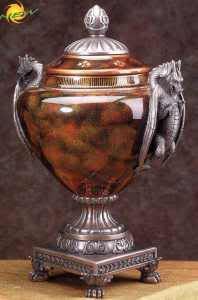
What do want for your ashes? Something extraordinary or just an ordinary scattering in the crematorium garden? Maybe you have a suggestion for Madison's ashes. Whatever, let me know. I hope to include a page on the different options for your ashes.

What do want for your ashes? Something extraordinary or just an ordinary scattering in the crematorium garden? Maybe you have a suggestion for Madison's ashes. Whatever, let me know. I hope to include a page on the different options for your ashes.
Friday, May 11, 2007
a Granny Smith
Funeral director Roger Barker stored ashes from cremations in a bucket in his shed and then passed them off as the remains of the victim of a motorbike accident.
In fact Barker had failed to collect the deceased's ashes in time for the scattering, which was witnessed by his grieving parents. Instead he used those he had kept in the shed at the bottom of his garden, Oxford Crown Court was told.

During his trial, staff from his company, based in Didcot, England, told the jury that their boss often ordered them to do "a Granny Smith", which meant filling an urn with left-over remains from the garden shed if nobody had got around to collecting the right ashes. Personally I would have no problem having my ashes thrown into Roger Barker's bucket. A chance to mix with new people. A chance to get to new places - the ashes from my feet to one place and those from my skull to another. But I'm a nihilist with a very sick sense of humour.
In fact Barker had failed to collect the deceased's ashes in time for the scattering, which was witnessed by his grieving parents. Instead he used those he had kept in the shed at the bottom of his garden, Oxford Crown Court was told.

During his trial, staff from his company, based in Didcot, England, told the jury that their boss often ordered them to do "a Granny Smith", which meant filling an urn with left-over remains from the garden shed if nobody had got around to collecting the right ashes. Personally I would have no problem having my ashes thrown into Roger Barker's bucket. A chance to mix with new people. A chance to get to new places - the ashes from my feet to one place and those from my skull to another. But I'm a nihilist with a very sick sense of humour.
Wednesday, May 09, 2007
Five pounds of ashes
That afternoon the pastor of the local Evangelical Baptist Church arrives to collect the ashes of his dearly departed God fearing mother. But the ashes have not been collected from the crematory. No problem.
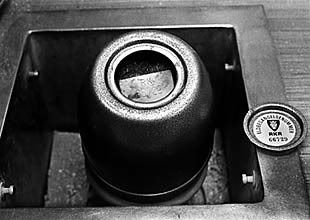
About five pounds of ashes are scooped out of the bucket and poured into an urn. The pastor takes the urn. You (or some of you anyway) and your new found friends are on your way to a nice Christian burial. Far fetched fiction? Of course. But not as far fetched as you might think..

About five pounds of ashes are scooped out of the bucket and poured into an urn. The pastor takes the urn. You (or some of you anyway) and your new found friends are on your way to a nice Christian burial. Far fetched fiction? Of course. But not as far fetched as you might think..
Tuesday, May 08, 2007
Five pounds of mixed ashes please
Imagine this. Your ashes wait at the funeral home. Uncollected. Unloved. One day the funeral home owner takes your urn off the shelf and pours your ashes into a bucket.
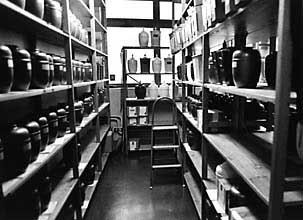
The bucket already contains the unclaimed ashes of a 22 year old sex worker who died tragically of a drug overdose. Next morning the ashes of a 25 year old gay man who died in an over enthusiastic bondage session are added to the bucket.

The bucket already contains the unclaimed ashes of a 22 year old sex worker who died tragically of a drug overdose. Next morning the ashes of a 25 year old gay man who died in an over enthusiastic bondage session are added to the bucket.
Monday, May 07, 2007
Honest - they are fakes
Of course fake ashes are used in TV and movie productions, but sometimes the audience does not realise. An episode of "The Simple Life" that showed hotel chain heiress Paris Hilton and sidekick Nicole Richie working at a funeral home upset some local residents.
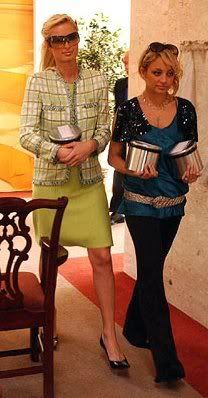
The pair spilled what appeared to be human ashes onto a carpet, then used a vacuum cleaner to clean them up. The ashes were actually a mixture of cat litter and cement, according to John Podesta, the owner of Kohler Funeral Home. Paris and Nicole can spill me, vacuum me up or grind me into the carpet under their high heels any time they like.

The pair spilled what appeared to be human ashes onto a carpet, then used a vacuum cleaner to clean them up. The ashes were actually a mixture of cat litter and cement, according to John Podesta, the owner of Kohler Funeral Home. Paris and Nicole can spill me, vacuum me up or grind me into the carpet under their high heels any time they like.
Sunday, May 06, 2007
Acid bath
If you don't like the idea of particles being shot at your ashes, they can be dissolved in acid instead. Using a method developed at the University of Tennessee, samples of your ashes are digested on a hotplate in nitric acid and hydrogen peroxide.
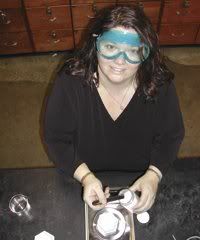
Your digested remains are then processed using an "inductively coupled plasma optical emission spectrometer" and the machine's output compared with that produced from cremains known to be genuine. The university has been analysing ashes produced by incinerating medical school cadavers to establish the range of element concentrations in genuine cremains.

Your digested remains are then processed using an "inductively coupled plasma optical emission spectrometer" and the machine's output compared with that produced from cremains known to be genuine. The university has been analysing ashes produced by incinerating medical school cadavers to establish the range of element concentrations in genuine cremains.
Friday, May 04, 2007
Smash my atoms
Even if the "cremains" are not realistic the family may never know "It is common practice for those receiving cremains not to actually look at them, not to open the vessel," says Dr. Gretchen Potts And it has happened. The bodies sent to Tri-State crematory (Noble, Georgia) between 1997 and 2002, were not cremated, but instead, stacked in storage buildings and tossed in the woods around the crematory. Families were given mixtures of cement and dirt rather than the ashes for their loved ones.

But the power of modern physics can find out whether your "ashes" are the real thing. All that is needed is a vial of your cremains. A particle accelerator accelerates hydrogen ions and transforms them into a proton beam. The beam smashes into your ashes, which send off X-rays that identify the elements they contain.

But the power of modern physics can find out whether your "ashes" are the real thing. All that is needed is a vial of your cremains. A particle accelerator accelerates hydrogen ions and transforms them into a proton beam. The beam smashes into your ashes, which send off X-rays that identify the elements they contain.
Thursday, May 03, 2007
How easy is it to fake human ashes?
Sandy's ashes or sandy "ashes". How easy is it to fake human ashes? Take a walk along the beach and you'll find lots of material to make fake cremains. A mixture of sand of other substances could be passed off as cremains.

According to Tom Bodkin, a forensic anthropologist with the Hamilton County Medical Examiner’s Office: "Those cremated remains could contain any fine powdery material like wood ash, cement, sand, soil, or concrete powder rather than actual cremains. All have a similar texture." So after Sandra is incinerated, will the urn contain Sandy or just be sandy?

According to Tom Bodkin, a forensic anthropologist with the Hamilton County Medical Examiner’s Office: "Those cremated remains could contain any fine powdery material like wood ash, cement, sand, soil, or concrete powder rather than actual cremains. All have a similar texture." So after Sandra is incinerated, will the urn contain Sandy or just be sandy?
Wednesday, May 02, 2007
Will they be my ashes?
A word of perspective; the vast majority of cremation professionals follow strict procedures to ensure your relatives will get the right ashes back. But there are a few cases where the wrong ashes were returned, and sometimes only fake ashes.
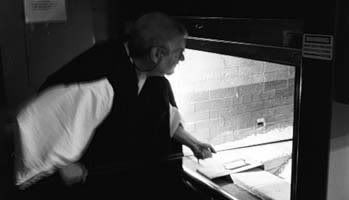
Most notably the Tri-State scandal in the USA. Such scandals are less likely, but not impossible, in the UK and Europe where cremation is more tightly regulated.

Most notably the Tri-State scandal in the USA. Such scandals are less likely, but not impossible, in the UK and Europe where cremation is more tightly regulated.
Tuesday, May 01, 2007
Life Gem
This young lady likes her jewelry, perhaps she'd like a LifeGem of grandad? (see inset) But there is always a cynic to piss on the parade. Mark Gershburg, director of European Gemological Laboratory (an independent laboratory that vouches for the quality of diamonds), points out it is impossible to distinguish LifeGem synthetic diamonds from other synthetic diamonds.
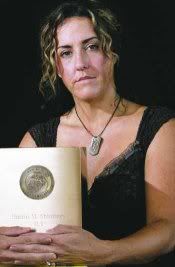
If that's the case, what stops LifeGems from producing synthetic diamonds from ordinary graphite, then passing them off as a bit of your dear uncle Harry? Indeed, what stops them from buying synthetic diamonds from other suppliers and reselling them to the bereaved at large mark-ups?
This site would not support this foul and baseless suspicion. LifeGem lawyers please note. In fact we would encourage the young lady to talk to grandad about becoming a LifeGem. It has been said that blue LifeGems were produced with the addition of the boron as a dopant, since the boron found in cremains is only trace element, and not sufficient colour the gem. But who cares if a bit of outside colour has been added?

If that's the case, what stops LifeGems from producing synthetic diamonds from ordinary graphite, then passing them off as a bit of your dear uncle Harry? Indeed, what stops them from buying synthetic diamonds from other suppliers and reselling them to the bereaved at large mark-ups?
This site would not support this foul and baseless suspicion. LifeGem lawyers please note. In fact we would encourage the young lady to talk to grandad about becoming a LifeGem. It has been said that blue LifeGems were produced with the addition of the boron as a dopant, since the boron found in cremains is only trace element, and not sufficient colour the gem. But who cares if a bit of outside colour has been added?
Subscribe to:
Posts (Atom)